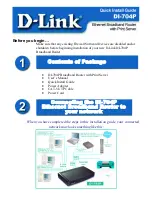
Web User Interface
25
Wi-Fi Protected Access (WPA / WPA2)
WPA was created by the Wi-Fi Alliance to address the limitations and weaknesses found in WEP. This protocol is mainly based on the 802.11i standard.
There are also two variations found in WPA called WPA-Personal (PSK) and WPA-Enterprise (EAP).
WPA-Enterprise requires the user to install a Radius Server on the network for authentication.
WPA-Personal does not require the user to install a Radius Server on the network.
Comparing WPA-PSK with WPA-EAP, WPA-PSK is seen as a weaker authentication but comparing WPA-PSK to WEP, WPA-PSK is far more secure than
WEP. WPA-EAP is the highest level of wireless security a user can use for wireless today.
WPA2 is an upgrade of WPA. WPA2 yet again solves some possible security issues found in WPA. WPA2 has two variations called WPA2-Personal (PSK)
and WPA2-Enterprise (EAP) which is the same as found with WPA.
WPA Mode:
Cipher Type:
Group Key Update:
Pass Phrase:
When WPA-Personal is selected for Authentication type,
you must also select a WPA mode from the drop-down
menu: AUTO (WPA or WPA2), WPA2 Only, or WPA Only.
WPA and WPA2 use different algorithms. AUTO (WPA or
WPA2) allows you to use both WPA and WPA2.
When you select WPA-Personal, you must also select AUTO,
AES, or TKIP from the pull down menu.
Select the interval during which the group key will be valid.
The default value of 1800 is recommended.
When you select WPA-Personal, please enter a Pass Phrase
in the corresponding field.
















































